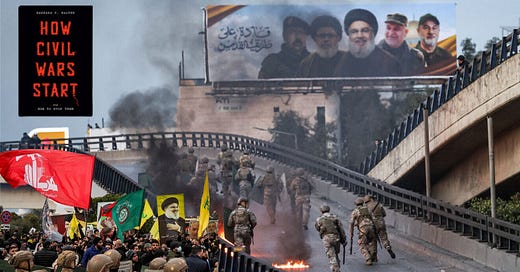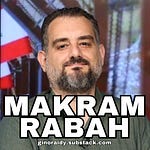One of the most memorable books I read last year was Barbara F. Walter’s How Civil Wars Start. She identifies eight key factors that often trigger civil conflicts. Lately, I’ve noticed many of these factors surfacing in Lebanon—especially in the aftermath of Hezbollah’s humiliating defeat in its latest war with Israel and the collapse of the Assad regime next door. Once so dominant, Lebanon’s de facto rulers now seem to be scrambling for any desperate measure to regain relevance, even if it’s clear these attempts are doomed to fail.
I don’t believe Lebanon is on the verge of another civil war, but Walter’s book is invaluable for understanding Hezbollah’s current mindset. That’s why I’ve decided to break down her insights here, in the hope of clarifying our best response strategy.
A prime example is the ceasefire agreement that Hezbollah itself signed. It’s largely kept under wraps, yet it remains binding. Remarkably, Hezbollah waited until its cabinet was removed and replaced by Joseph Aoun and Nawaf Salam before it began symbolically opposing the same terms it forced along with Israel on the entire country, most of which did not want this failed “support” front disaster.
With that backdrop, let’s look at Walter’s eight factors and how they map onto Lebanon today.
The Iranian Aerial Smuggling Route
Threats against Iranian-origin flights, sometimes stopping them from landing in Lebanon or Syria, aren’t new. Even before Hezbollah’s most recent misadventure, we saw similar incidents. Back then, the transportation minister was a Hezbollah appointee, and the group was careful not to stir its base if it meant revealing their weakness against Israel. Now that Hezbollah has lost much of its government clout, it’s using the Lebanese state as a convenient “new enemy”, an easy target. After all, the latest conflict laid bare their military ineptitude when facing Israel, so fabricating another threat is their way of rallying disgruntled supporters still waiting for the promised reconstruction money.
Hezbollah supporters have gone so far as chanting “The Shia have conquered Lebanon” and attacking UN peacekeepers, burning their vehicles. In my view, this is Hezbollah’s cynical gamble. They excel at oppressing Lebanese civilians, Syrians, and Palestinians refugees—not at beating Israel. For proof, see how Israel pushed into “Hezbollah territory” while the group redeployed its elite Radwan forces to save Bashar al-Assad from a lightning offensive, failing disastrously and losing billions of dollars, thousands of fighters, and they took countless civilian lives in the process.
Today is the first real test for Lebanon’s new government. Will it stand against Hezbollah’s intimidation as the group shifts focus from a failed “resistance” campaign to staging battles against a Lebanese state no longer under its thumb? Will Salam and Aoun cave, allowing Hezbollah to redirect its aggression inward? Will those who want genuine reform succumb to this choreographed provocation?
I believe Lebanon can ride this out if we remain steadfast—just as we did when Joseph Aoun and Nawaf Salam confronted Hezbollah’s and the banks’ smear campaigns the past two months. This is just the latest in Hezbollah’s “stages of grief” after a humiliating defeat that’s left it weak and directionless.
Yes, a full-blown civil war is unlikely because Hezbollah depleted its military capital propping up Assad and botching its involvement with Hamas. But we could still spiral downward if we allow Hezbollah to operate without accountability. Arresting a few of its members for specific crimes is a start, not a finish. We should also stay alert for any attempt by Hezbollah to resurrect the same ceasefire terms it once sanctioned—just so it can scapegoat a new “enemy” and feed its disoriented base a fresh narrative.
1. Civil Wars Aren’t Rare Flukes
Walter underscores that civil wars have become the dominant mode of conflict worldwide. They’re chaotic and can spill over into neighboring countries, dragging in refugees and major powers.
In Our Case:
Hezbollah, aware its influence is slipping, is escalating by blocking Beirut’s airport or simply threatening to do so. That move alone would amplified internal tensions, challenging the government’s authority and reminding everyone that Lebanon’s fragile stability remains at risk. Recall the days when Iranian commercial flights were similarly threatened but a Hezbollah-linked minister quietly kept things from blowing up. Now, with a non-Hezbollah minister, the group is more inclined to fuel domestic chaos.
2. Governance on the Brink
Walter cites “anocracies”—systems caught between democracy and authoritarianism—as especially vulnerable to civil strife.
In Our Case:
Lebanon’s bizarre sectarian power-sharing arrangement can stagger along—until it doesn’t. Having Hezbollah as a “state within a state” exemplifies how the central government is perpetually undermined. If Hezbollah is truly losing traction, brandishing a blockade is a way of yelling “We’re still relevant!” while further exposing the government’s frailty.
The Lebanese Armed Forces must stand firm against Hezbollah’s bullying. It’s not just about confronting the group; it’s about showing all Lebanese that the old playbook—Hezbollah dictating the national agenda—no longer applies. This is the Joseph Aoun–Nawaf Salam government’s first big trial.
3. Identity Politics and Stoking Sectarian Grievances
Walter shows how manipulative leaders can exploit identity politics to fuel large-scale conflict.
In Our Case:
Hezbollah has long painted itself as the Shia community’s guardian against Israel and “Sunni extremism.” With the group’s image battered by financial ruin and corruption, it’s falling back on simplistic “protector” rhetoric. Blockading the airport or inciting attacks on UN peacekeepers aims to remind rivals and allies alike: “We’re still the big guns.”
On the flip side, this ploy deepens sectarian distrust—Sunnis, Christians, Druze, and moderate Shia may all feel threatened. And the Lebanese Army, more confident after experiences like Tayyouneh, will resist more strongly than before. Ultimately, Hezbollah’s theatrics also harm Shia communities by painting them as a monolithic bloc at perpetual odds with the state.
4. Spotting the Red Flags
Walter draws on data (like Polity indexes) to show that polarization and institutional decay often come before internal violence.
In Our Case:
Economic desperation is universal in Lebanon: the currency is in free fall, the banks are crippled, and the political class is inert. Any new standoff triggered by Hezbollah—like an airport blockade—signals deeper fragmentation. Where institutions fail, violence can quickly become the only perceived way to seek justice.
That’s why Hezbollah’s intimidation must be exposed and dismissed for the sham it is. If not, other groups who fear accountability might adopt the same tactics, especially now that Hezbollah’s power is flagging and it’s grasping for ways to seem strong.
5. Lessons from Other Conflict Hotspots
Walter references Yugoslavia, Iraq, Syria—nations undone by power vacuums, sectarianism, and weak laws.
In Our Case:
Lebanon’s 1975–1990 civil war taught us how easily external influences and multiple militias can plunge a fragile society into chaos.
Today may be different, but not by much: the state is still near-bankrupt, armed groups can undermine it, and regional powers keep meddling.
When a major faction feels cornered or opportunistic, it can escalate quickly. Testing the airport blockade is Hezbollah’s way of gauging the new government’s resolve—especially after decades of governments obedient to the “axis of resistance” which only ever served the regimes in Syria and Iran, never Lebanon, much less its Shia community.
6. “Stable” Countries Aren’t Invincible
Even seemingly solid democracies can unravel if they fail to address polarization and institutional weakness.
In Our Case:
Lebanon’s no stranger to near-collapse, yet it’s dodged another civil war for over three decades. But the structural defects—sectarian competition, corruption, foreign manipulation—remain unresolved. If Hezbollah escalates or if a rival faction overreacts, the country’s thin balance could crumble. The group’s desperation only heightens this danger.
7. Don’t Ignore Early Warnings
Walter’s final note: peace is precarious, and turning a blind eye is perilous.
In Our Case:
Anyone downplaying an airport blockade as mere theatrics should remember how catastrophic conflicts often start small. Lebanon’s civil war history proves once gunfire begins, reversing course becomes nearly impossible. This is the moment for heightened awareness—across all sects, officials, and international partners.
Hezbollah is in a bind: it spent billions in Syria propping up Assad, lost thousands of fighters, and made zero real progress against Israel. That desperation can quickly pivot inward if we allow it, especially now that Hezbollah understands without a doubt its tactics are ineffective against Israel.
There’s no civil war looming unless we give Hezbollah free rein. Holding them accountable under the rule of law is the only safeguard against a new spiral. Any attempt by Hezbollah to resurrect previous deals it once endorsed—just to engineer a domestic bogeyman—should be called out as the ploy it is.
8. Ways to Stop the Descent
Walter’s recipe for avoiding civil war: reinforce institutions, address core grievances, and reduce polarization.
In Our Case:
Reinforce State Power: The government must assert control over critical infrastructure (e.g., the airport, port, the borders).
Tackle Economic and Social Woes: Real reforms that alleviate financial misery deprive Hezbollah of the “defender of the downtrodden” narrative.
Dialogue Over Force: The entire political class should realize that violence torpedoes everyone’s future. External mediators can help, but the impetus has to come from within. And bowing to Hezbollah’s threats nullifies any progress we’ve seen with new leadership.
Limit External Meddling: Foreign interventions (looking at you, Macron) that repeatedly rescue Hezbollah from self-inflicted trouble only postpone Lebanon’s real reckoning.
Arresting Hezbollah members for crimes is an important first step, but it must be followed by systematic accountability to end their “above the law” status.
Final Thoughts
Barbara Walter’s framework, applied to Hezbollah’s latest standoff, reveals all the classic warning signs: a faction losing power, playing the sectarian card, undermining weak governance, and seeking to invent new enemies. Lebanon has all the ingredients of a perfect storm.
The question now: Will Lebanon’s new leaders and their supporters stop this powder keg from exploding again? Will Hezbollah finally face the consequences of its colossal failures and relinquish its chokehold on the country?
Time is short to step away from the brink, but it hasn’t run out yet. If Hezbollah wants to drag us into more turmoil, we have to show them that era is over—and our patience is, too.














Share this post